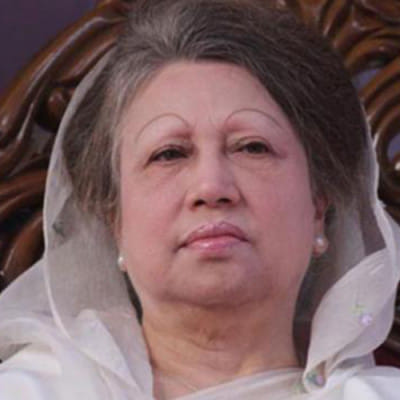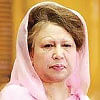Is Khaleda Zia eligible for polls?

A number of Supreme Court verdicts in cases related to Jatiya Party Chairman HM Ershad seem to have the answer to a million-dollar question: Is the BNP chairperson eligible to contest the upcoming parliamentary polls?
Two recent verdicts delivered by the High Court and a special court have fuelled the ongoing debate about Khaleda Zia's eligibility.
On Tuesday, the HC rejected her appeal against the conviction in Zia Orphanage Trust graft case in which she was sentenced to five years imprisonment on charge of misappropriating over Tk 2.1 crore that had come from a foreign bank in grants for orphans. The HC doubled her sentence.
The previous day, a special court sentenced her to seven years in prison in Zia Charitable Trust corruption case for abusing power as premier to collect and spend Tk 6.52 crore for different purposes, including purchasing of 42 kathas of land in the capital to set up the trust.
It remains a disputed issue as to when the disqualification under the article 66 (2) (d) of the constitution will take effect on an individual.
The article says, “A person shall be disqualified for election as, or for being, a member of Parliament who has been, on conviction for a criminal offence involving moral turpitude, sentenced to imprisonment for a term of not less than two years, unless a period of five years has elapsed since his release.”
The question is whether the above is applicable for Khaleda.
In the Zia Orphanage Trust graft case, she lost her appeal in the High Court. Now she can appeal to the Appellate Division.
And in the Zia Charitable Trust corruption case, she has yet to file an appeal against the special court verdict. She can first go to the High Court and then to the Appellate Division.
The appeal processes are not complete. The question is: Is Khaleda eligible for election in such a situation?
WHEN DISQUALIFICATION TAKES EFFECT?
Let's recall here the SC verdicts in the cases related to former president HM Ershad, who staged a coup on March 24, 1982, and was ousted in a mass upsurge on December 6, 1990. He was sentenced in multiple criminal cases involving moral turpitude several years later.
From jail, he contested and was elected MP in the 1991 election when he was not a convict.
But in the 1996 election, the question was raised about his eligibility to run as he was convicted in the Janata Tower corruption case in 1993.
In the case, he was charged with abusing state power to allocate two plots in Karwan Bazar for his wife Rawshan Ershad.
He was sentenced to seven years imprisonment on June 7, 1993. He filed an appeal with the HC against the conviction. With the appeal pending, he filed nomination papers to contest the 1996 election.
AKM Mayeedul Islam, one of his rivals, objected.
The returning officer dismissed the objection and accepted the nomination paper on the ground that Ershad's appeal process was not complete.
Mayeedul filed a writ petition with the HC challenging the RO's decision. After holding a long hearing, the HC summarily dismissed the petition.
Mayeedul then fled a petition with the Appellate Division. The Appellate Division too rejected his petition.
In the verdict, the Appellate Division observed that Ershad would not be disqualified from running as the order of his conviction has not attained finality.
Ershad was allowed to contest the June 1996 polls.
The above verdicts that allowed Ershad to run suggest that a convict can run when his or her appeal against the conviction is pending and the conviction is not conclusive.
It has also been proved that a lawmaker's membership in parliament cannot be cancelled if his or her appeal challenging a conviction is pending with a court.
Again, Ershad's case is an example.
In response to the Ershad's appeal against his conviction in the Janata Tower case, the HC on August 24, 2000, upheld the conviction.
He then filed a leave to appeal with the Appellate Division against the HC verdict.
But when his appeal was pending with the Appellate Division, the parliament secretariat banked on the HC verdict and issued a notification on August 30, 2000, declaring his parliament seat vacant. It cited the article 66 (2) (d) of the constitution.
Ershad filed a petition with the HC challenging the notification. The HC in a verdict on May, 2001, declared the notification illegal as it was issued when Ershad's appeal was pending with the Appellate Division.
The Appellate Division on November 23, 2000, upheld his conviction.
And after that, the HC in a fresh case on February 6, 2001, declared him disqualified as an MP.
This again proves that a lawmaker, if convicted after being elected, can continue as MP if his or her appeal is pending and his conviction does not reach finality.
Disaster Management and Relief Minister Mofazzal Hossain Chowdhury Maya and Awami League MP Abdur Rahman Bodi are latest examples.
Maya was sentenced to 13 years in jail and fined Tk 5 crore by a special court in a graft case on February, 2008.
In response to an appeal filed by Maya, the HC acquitted him in 2010 observing that “no legal notice was served upon Maya” before prosecuting him in the case filed by the Anti-Corruption Commission.
Maya was elected MP in the January, 2014, election.
In response to an appeal filed by the ACC, the Appellate Division on June 14, 2015, cancelled the HC verdict that acquitted Maya. It asked the HC for rehearing Maya's appeal. Cancellation of the HC verdict by the Appellate Division means Maya's conviction was upheld.
Maya continued being a minister for around three and a half years as his conviction did not reach finality. Finally, on October 8 this year, the HC again acquitted Maya.
The ACC is yet to decide if it will appeal.
AL MP Abdur Rahman Bodi, who was elected in 2014, was sentenced to three years in prison for corruption by a special court in November 2016.
Bodi went to jail and was released on bail. He challenged his conviction. His appeal is pending and he remains an MP.
The above instances make it clear that as long as their convictions have not become final, a parliamentary aspirant cannot be disqualified from running and an incumbent MP cannot be removed citing article 66 (2) (d) of the constitution.
These instances may suggest answers to the question: Is Khaleda Zia eligible to contest the upcoming parliamentary polls?

 For all latest news, follow The Daily Star's Google News channel.
For all latest news, follow The Daily Star's Google News channel. 







Comments